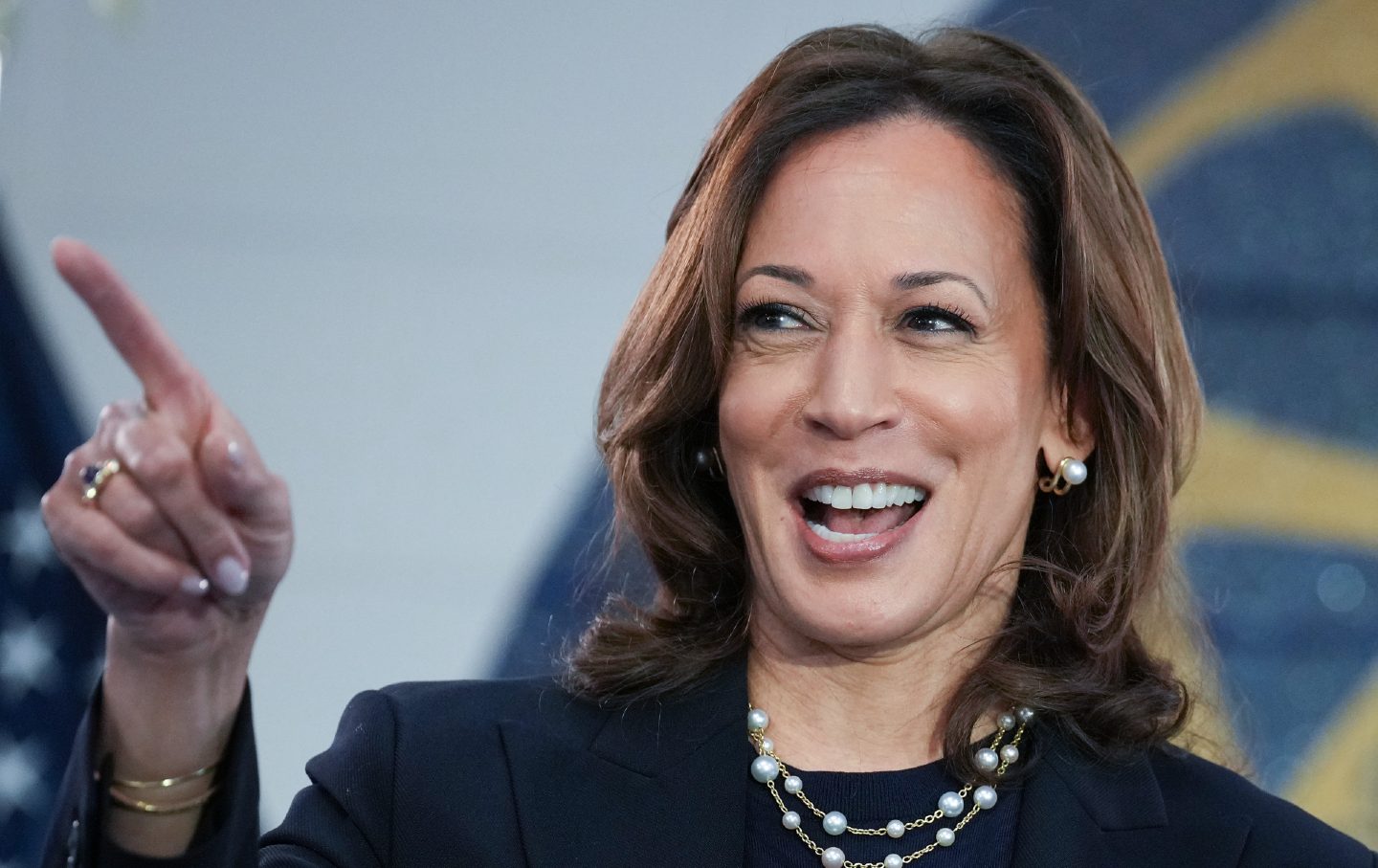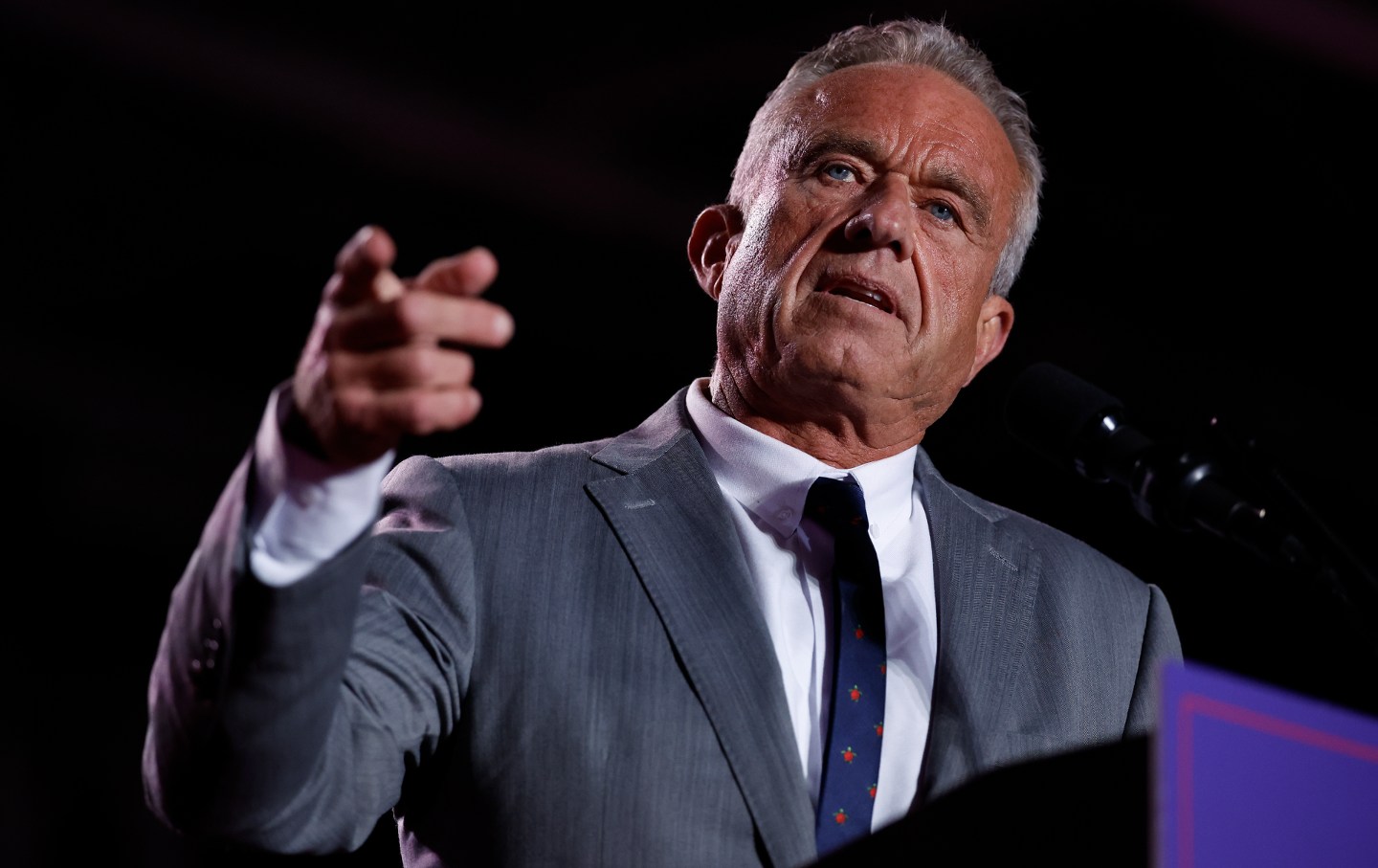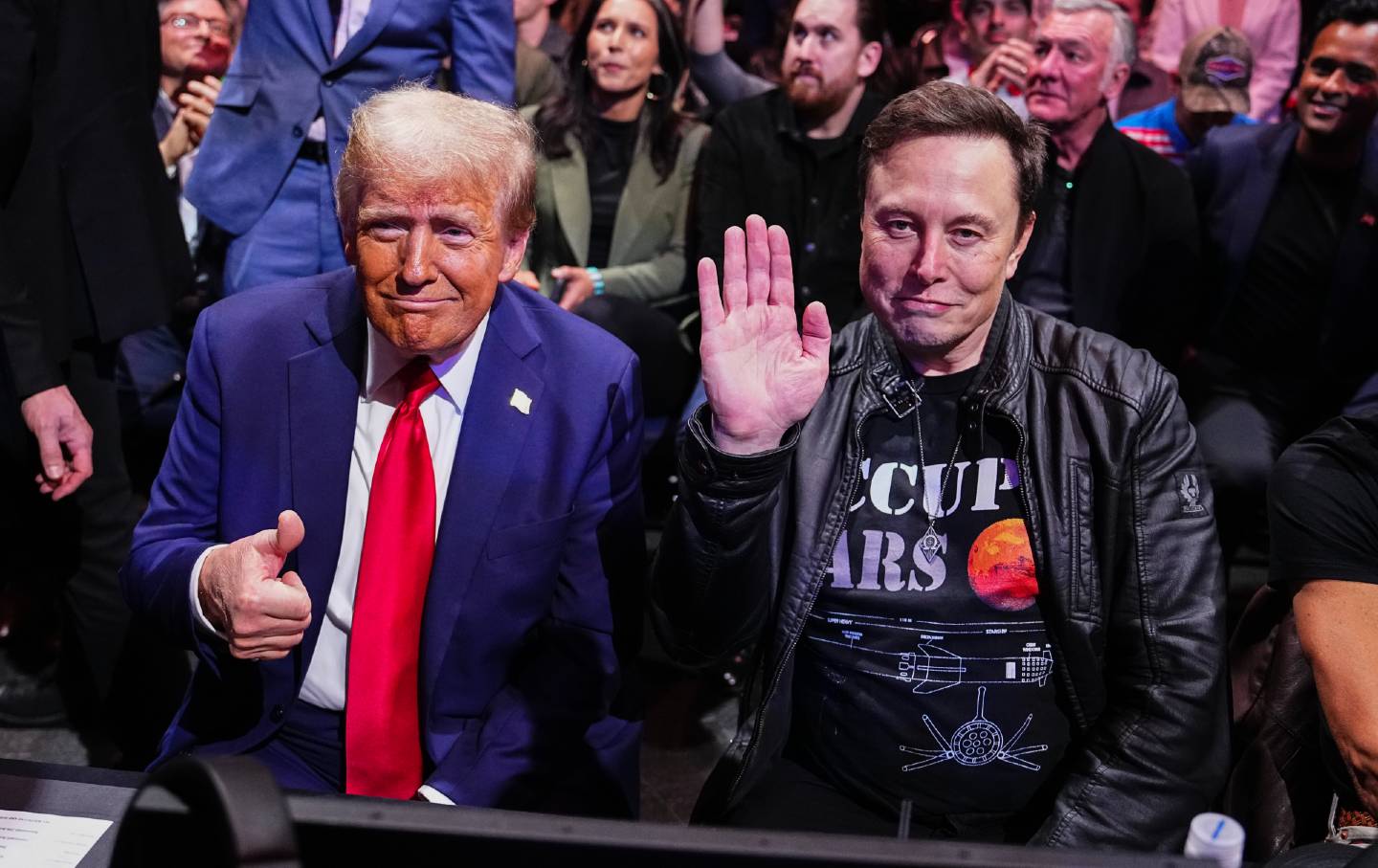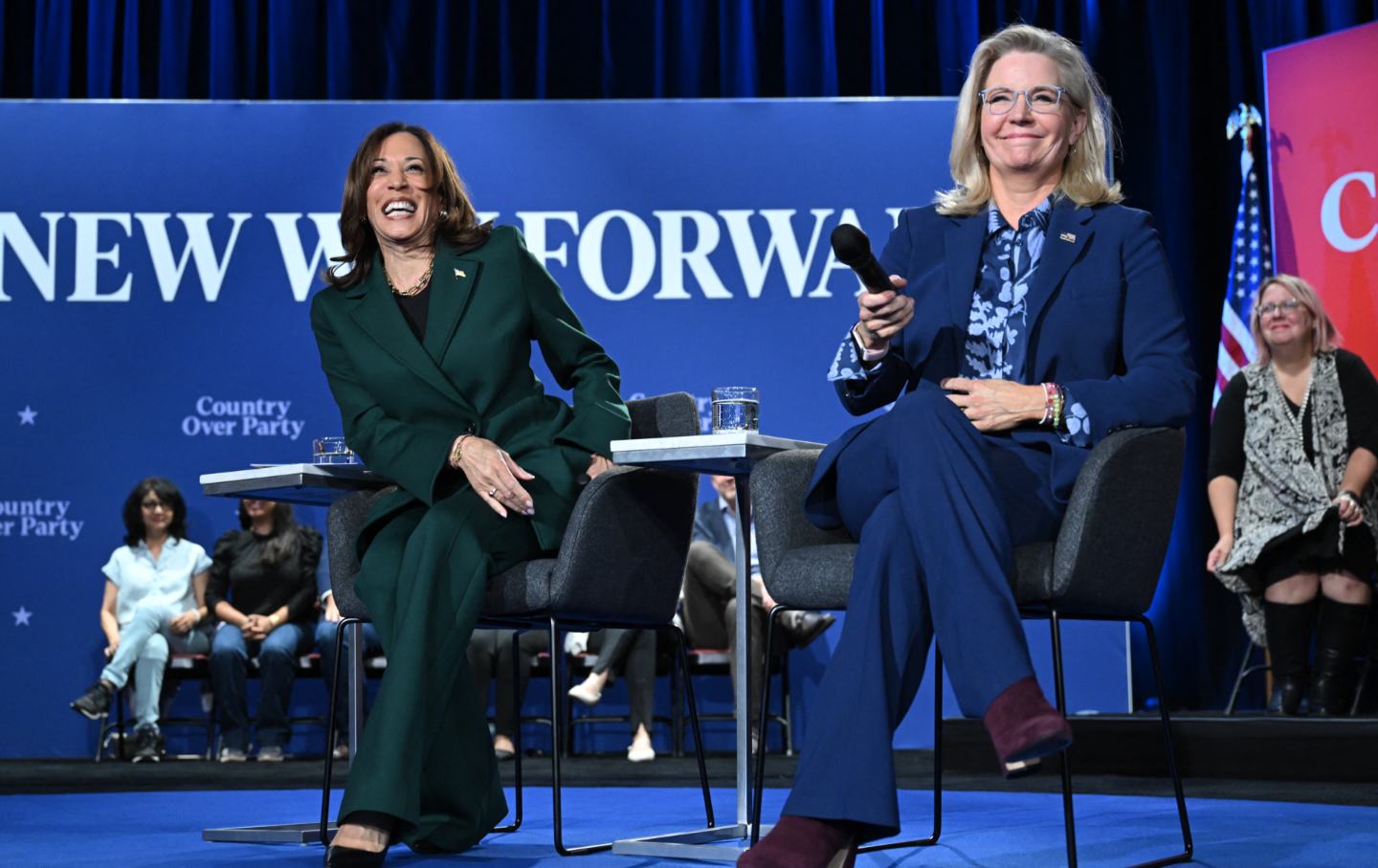At the Convention in Chicago, Kamala Harris Can Seal the Deal
By sharing her compelling story, the Democratic nominee can put her party firmly on the path to victory.

Not all political conventions are created equal: Many are routine affairs where parties rehearse the familiar script of partisanship and dutifully perform the rituals of democracy. But some conventions are truly history-making, either because they confirm an image of party chaos that insures defeat (as in the infamous Republican convention of 1964 and the Democratic convention of 1968) or because they introduce a new political star to the American public. Bill Clinton, who had previously been obscure to most Americans, pulled off that latter feat in the convention of 1992, where his vivid story of growing up in the white working class with a single mother won him the populist credibility that secured him the White House.
Writing in The Atlantic, the veteran political analyst Ronald Brownstein makes a powerful argument that this week’s Democratic National Convention could be one of the history-making ones, thanks to the fact that Kamala Harris, like Clinton before her, remains for much of the public an unknown quantity—a blank slate ready to be filled in. Brownstein contends that “no presidential nominee in decades has approached their convention with a greater opportunity to reshape their public image than Vice President Kamala Harris.”
Aside from the comparison with Bill Clinton, Brownstein also notes, “Harris is the first nonincumbent since Hubert Humphrey in 1968 to claim either party’s presidential nomination without first enduring months of grueling primary contests. Because Harris did not experience the setbacks and triumphs that come from waging such a fight, public impressions of her are uncommonly shallow for a nominee on the convention’s eve, strategists in both parties agree.”
While acknowledging that the current era of partisan polarization means candidates have only a narrow room to rise (or, conversely, to sink), Brownstein makes a convincing case for 2024 offering Harris the chance to solidify her standing in a way that is essential to her presidential bid.
Harris heads into the convention already riding a wave of enthusiasm. But if Brownstein is accurate in gauging the opportunity the convention presents, Harris has a chance to catch an even bigger wave—one that would ensure a solid electoral victory.
Joe Biden’s decision to withdraw his nomination and Harris’s rapid elevation to presumptive nominee has transformed this election. The two-man grudge match had been a glum, dispirited affair—particularly for Democrats, when it looked like a sad rerun of 2020: Biden versus Trump, round two, but with a different likely winner. The prospect of choosing between two elderly politicians, both prone to outdated rhetoric, made it seem like America had sunk from democracy to gerontocracy.
It seems America is hungry for a fresh face—a fact that has already allowed Harris to take a lead in polls and election models (notably that of Nate Silver, who was bullish on Trump but now sees Harris as the favorite). Political analyst Joshua A. Cohen estimates that more than 100 Electoral College votes that were previously leaning toward Trump have shifted toward Harris—an astonishing reversal that puts the Democrats in a far more favorable position.
Harris has the wind at her back precisely because many Americans who hate Trump had also been dispirited by Biden. So far, they seem willing to give Harris a chance. Harris’s challenge is to turn these feel-good vibes into a fully mobilized electorate ready to flood the polls on Election Day.
Harris will be helped by the fact that she is not just a fresh face in the campaign. She also has a gripping biographical story that speaks to the emerging America. Harris’s late mother was an immigrant from India, and her father is an immigrant from Jamaica. Donald Trump has tried to use Harris’s multiethnic family history as a wedge to divide Black voters by absurdly claiming that Harris is not really Black. But the meeting of Harris’s parents is a very American story, one that speaks to an optimistic vision of the country as a haven for all. It is also a story that serves as an eloquent rebuke to Trump’s xenophobia and racism.
So far, Harris has been chary of defining herself as anything more than a generic Democrat, a profile reinforced by her pick of Minnesota Governor Tim Walz. Harris has made a few policy pitches that are gratifyingly progressive, notably her promise to fight corporate price gouging on food and to provide financial support to low-income first-time homeowners. With the eyes of the nation watching the DNC, Harris would be well-advised to offer many more such policies to help economically struggling Americans. That would turn a feel-good event into durable political support.
Beyond biography and policy, the other main task at the convention is to strengthen party unity. Biden’s decision to withdraw wasn’t made without internal strife. The fact is, Biden was reluctant to give up his aspiration for a second term. Persuading him to do so took a concerted effort, reportedly led by former House speaker Nancy Pelosi and former president Barack Obama. However, since his decision to withdraw, Biden has been a trooper, an admirable and eager supporter of Harris’s campaign.
Biden will be speaking on Monday night, which will surely be an occasion for the party to honor his genuine achievements, and also for Biden himself to graciously pass the torch. Hillary Clinton will also be speaking that first night and will surely remind the audience of the steep price paid by American women following Trump’s election victory in 2016, which among other things led directly to the end of a constitutional right to abortion.
Barack Obama, the most skilled living orator in American politics, will take the stage on Tuesday. Former first lady Michelle Obama will speak the same evening, as will Harris’s husband, Doug Emhoff. Emhoff’s prominent role at the event stands in contrast to Melania Trump’s silent, sullen presence at the GOP convention. The following evening’s highlights include speeches from Bill Clinton and Tim Walz, Harris’s running mate. Harris herself will be the primary speaker on the final night of the convention on Thursday.
This combination of powerhouse speakers, who can all address different parts of the Democratic coalition, stands in contrast to the Republican convention, which was all about one man: Trump. Notably, the two living Republicans who also ran for president, George W. Bush and Mitt Romney, were nowhere to be seen in Milwaukee, evidence of how the GOP has become thoroughly Trumpized.
Popular
“swipe left below to view more authors”Swipe →To be sure, there is also considerable disunity on the Democratic Party side, especially on the issue of Gaza, where the Biden administration’s unpopular policy of unlimited support of Israel threatens to capsize the coalition. The highest drama of the convention will be played out over Gaza, with protesters on the outside echoing the concern of delegates elected to carry forward the “uncommitted” message that the party must change on this issue.
The danger of a divided—and divisive—convention is real. Harris’s ability to navigate the Israel/Palestine divide is the first big test of her political acumen. Harris has a difficult task ahead of her, but if she can manage to secure the votes of wavering parts of the Democratic coalition, this convention will truly be historic.
We cannot back down
We now confront a second Trump presidency.
There’s not a moment to lose. We must harness our fears, our grief, and yes, our anger, to resist the dangerous policies Donald Trump will unleash on our country. We rededicate ourselves to our role as journalists and writers of principle and conscience.
Today, we also steel ourselves for the fight ahead. It will demand a fearless spirit, an informed mind, wise analysis, and humane resistance. We face the enactment of Project 2025, a far-right supreme court, political authoritarianism, increasing inequality and record homelessness, a looming climate crisis, and conflicts abroad. The Nation will expose and propose, nurture investigative reporting, and stand together as a community to keep hope and possibility alive. The Nation’s work will continue—as it has in good and not-so-good times—to develop alternative ideas and visions, to deepen our mission of truth-telling and deep reporting, and to further solidarity in a nation divided.
Armed with a remarkable 160 years of bold, independent journalism, our mandate today remains the same as when abolitionists first founded The Nation—to uphold the principles of democracy and freedom, serve as a beacon through the darkest days of resistance, and to envision and struggle for a brighter future.
The day is dark, the forces arrayed are tenacious, but as the late Nation editorial board member Toni Morrison wrote “No! This is precisely the time when artists go to work. There is no time for despair, no place for self-pity, no need for silence, no room for fear. We speak, we write, we do language. That is how civilizations heal.”
I urge you to stand with The Nation and donate today.
Onwards,
Katrina vanden Heuvel
Editorial Director and Publisher, The Nation
More from The Nation

The Red Wave Didn't Hit State Houses in This Election The Red Wave Didn't Hit State Houses in This Election
State-level Democrats largely held their ground, even scoring key victories in battleground states—and under Trump, that's going to matter.

How Nominally Pro-Choice RFK Jr. Can Get Anti-Abortion Groups to Back His HHS Nomination How Nominally Pro-Choice RFK Jr. Can Get Anti-Abortion Groups to Back His HHS Nomination
He can pick a strident abortion opponent like Roger Severino, who wrote the Project 2025 chapter on HHS, as his number two.

Red Flags Red Flags
The result of the presidential election reflects individual and collective responsibility.

How Loyalty Trumps Qualification in Trump Universe How Loyalty Trumps Qualification in Trump Universe
Meet “first buddy” Elon Musk.

Bury the #Resistance, Once and For All Bury the #Resistance, Once and For All
It had a bad run, and now it’s over. Let’s move on and find a new way to fight the right.

Trans People Shouldn’t Be Scapegoated for Democrats’ Failures Trans People Shouldn’t Be Scapegoated for Democrats’ Failures
Politicians and pundits are stoking a backlash to trans rights in the wake of the election. They’re playing a dangerous game.


